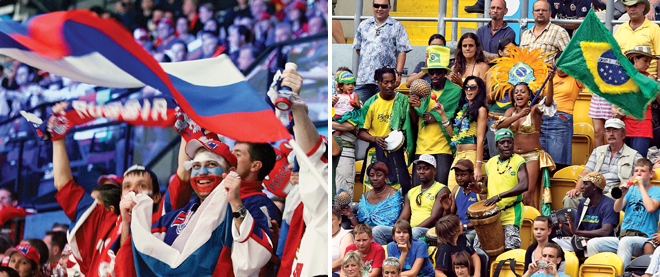A sport nut’s dream: Sochi’s Olympics vs. Brazil’s World Cup
The soccer tourney will draw bigger audiences, but more athletes will shine in Russia
Leonhard Foeger/Reuters; Martin Rose/Getty Images
Share

Most Canadians can tell you where they were when Sidney Crosby scored the gold-medal overtime winner on home soil at the 2010 Winter Games. More than 80 per cent of the country—26.5 million Canadians—tuned in to watch at least part of that final. The silver medal-winning Americans were fixed to their TVs, too. With an average audience of 27.6 million, it was the most-watched hockey game in the U.S. since the “Miracle on Ice” at the 1980 Olympics. But even if Canada makes it to the gold-medal final against the hometown Russians at the Sochi Games, the Olympic torch can’t hold a candle to another major sporting event in 2014: the FIFA World Cup hosted in that sport’s mecca, Brazil.
More than 900 million people watched at least one minute of the 2010 World Cup final between Spain and Netherlands. And most of those viewers weren’t channel surfers; nearly 620 million people watched at home for at least 20 minutes. That World Cup was broadcast in every country and territory on Earth (including Antarctica and the Arctic), reaching 3.2 billion people—46.4 per cent of the global population—over the course of the month-long spectacle. Comparatively, the Vancouver Games had just over half that audience, approximately 1.8 billion viewers. So while both events will forever be massive draws for a worldwide audience, if the World Cup of soccer and the Winter Olympics continue on the same four-year cycle, every country that hosts the Winter Games will always win the silver on that year’s sporting calendar.
What Brazil and Russia have in common are soaring costs. Construction on the 12 stadiums in Brazil will go over the budget laid out in 2010 by approximately US$435 million, according to government figures, to a total of US$3.5 billion. And despite years of preparation, the organizers recently admitted that half of those stadiums won’t be ready by FIFA’s deadline of the end of 2013. Meanwhile, in Russia, the Sochi Games will be the most expensive in Olympic history (summer or winter), costing more than US$50 billion. The country originally estimated its tab would be just over US$12 billion when it won the bid in 2007, while the 2010 Vancouver Games had a final bill of about $7 billion. Experts say Russia is unlikely to recover the money spent as host, while Brazil is predicting an $11-billion boost in tourism this year, which would equal the event’s overall budget.
When it comes to money, advertisers are flocking to the World Cup, too. The London Summer Games might unofficially have been tagged the “Twitter Games,” but the cost for a globally promoted tweet during the upcoming World Cup could reach as high as $600,000 for a single day, according to one report.
But where the Olympics win gold is in representation. In Sochi, more than 2,500 athletes from at least 51 countries will compete in 98 events from 15 different sports. When Brazil welcomes the 32 qualifying countries in June, many of the 736 players might not see a single minute on the pitch.
From a fan’s perspective, having the World Cup and Olympics in the same year is a sports nut’s dream come true. Russians need not worry about competing with soccer fans in 2014. Instead, they can use Sochi as a preview for when the whole world truly tunes in to watch—at the FIFA 2018 World Cup, in Russia.